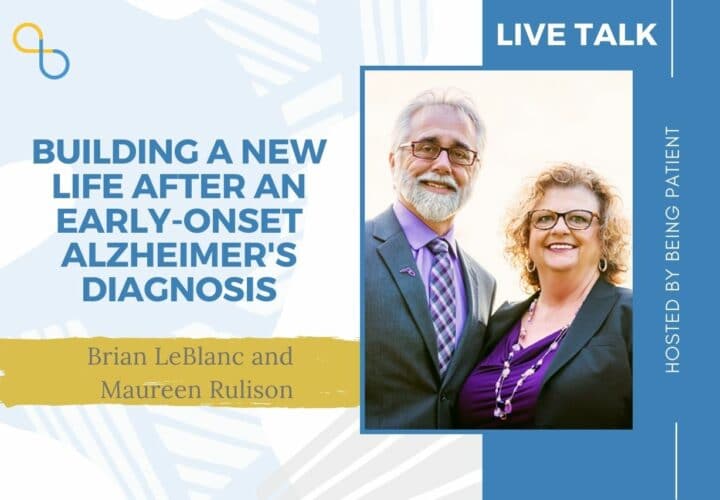How do you interact with someone who has Alzheimer's or another form of dementia? Here are seven expert-vetted pointers.
People with Alzheimer’s and other forms of dementia are often treated as though they are less capable than they actually are. This can be hurtful and isolating, and it can make it difficult for people with dementia to maintain their independence and self-esteem. Many support groups are aimed at caregivers, who do undergo a huge amount of stress. But people living with Alzheimer’s, themselves, feel the effects of social isolation.
“There is a big stigma. I think there’s a fear of, ‘How do I talk to that person?,'” Pamela Roberts, 61, who has dementia. “But I’m still me, I can still hold a conversation, I can still recognize people and even when I can’t, I still want to be talked to the same.”
Dementia affects tens of millions of people worldwide, and one in three Americans over the age of 85. It’s a common condition that’s becoming more common every day. And yet, stigma and isolation may only grow if the general public is too timid, nervous or uncertain about how to engage with or support someone living with Alzheimer’s or another form of dementia. According to a 2018 survey of 2,300 people in the U.K., over half of survey respondents were not confident speaking with dementia patients or inviting them to a meal in their home. If confronted with a confused person with dementia in a public space, two thirds said they wouldn’t know how to help them.
These respondents expressed the exact same concerns as people living with dementia did, when they were asked about how they would respond to a diagnosis. Almost half worried that they would be treated like a child — and over a quarter said they worried their friends and family would no longer want to see them.
While more and more cities are becoming dementia-inclusive, it doesn’t take much to become a better dementia friend yourself, according to the Alzheimer’s Society, which released a guide on how to take action to help dementia patients.
“It doesn’t have to be complicated,” said Jeremy Hughes, Chief Executive of Alzheimer’s Society. “Committing to simple actions like being more patient or including a person with dementia in the conversation will all help.”
7 pointers for talking to someone with dementia
Here are their guidelines on how to talk to someone with dementia and make them feel included, developed with dementia patients themselves:
- Communicate: Speak to the person with dementia like you normally would. They’re still the person they were before diagnosis.
- Listen: Be sensitive about listening to people with cognitive impairment. They still have valuable insights.
- Include: Continue to invite the person with dementia places. Friends and social engagement are stimulating and have been shown to possibly even delay the progression of the disease.
- Offer help: If you encounter someone with dementia and they seem confused, simply ask if you can help them.
- Be patient: They might not do things the way they once did, or with the same swiftness, but they can still accomplish tasks.
- Gently inquire: Don’t be afraid to ask questions. Taking the time to understand dementia shows that you are an ally.
- Caregiver support: Caregivers often go without help or support, but the dementia of their loved one can turn their life upside down.
“Understand I’m still the person I always was, but now I have memory and cognitive problems,” Shelagh Robinson, 77, told the Alzheimer’s Society in an interview. My diagnosis of dementia doesn’t and shouldn’t define me. Nor should I be ashamed of what is beyond my control. I am still me. Realize I have value, skills, knowledge and experience.”




i was told i have Alzheimer’s 1.1/2 years ago i don’t know what to expect because i have chronic health issues to do with lungs, if i get pneumonia at what stage am i weak enough that it is imminent
Mary, I feel for you and hope you have a caring environment to support you. Perhaps they can get information on what you may expect. This website too offers valuable information. My heart goes out to you.
A dementia patient takes time to collect words and communicate. So you need to be patient when they are speaking to understand them in the right way.
I really need help with this one. My husband loves repeating old stories. I run a business out of my home and my time is valuable. I feel I don’t have time to listen to the same story every and every again. Help!
Initially, my mom was diagnosed with Advanced Alzheimer’s and dementia. I found out several months ago that I too have Early Onset Alzheimer’s! My mom is being well cared at a facility but soon may be living in a group home, with other Alzheimer’s disease. I’ve sent friends to this group
The wealth of information is astounding! Thank you for starting this site and giving us valuable information so we know better what to expect in years and months to come. Bless you all!
my mom can no longer live alone- she has been given the diagnosis of dementia and has had a long history of medication for bi-polar disorder.
i am hoping to learn and be able to be a supportive daughter as she progresses.
My husband refuses to accept his Alzheimer’s diagnosis. He is probably in the late-middle stage. He has no shirt term memory and is starting to forget where things are, both in the house and in the community. He thinks he can still drive so I have to beat him to the driver’s seat when we go anywhere. I have had to take over the finances since it is beyond him. However, as a retired accounted, he thinks he can still manage bills, checkbooks, etc. He thinks he is checking our records every week but he has not done so for over five months. How do I keep him safe while he becomes angry with me for taking over his former tasks?
I’m having those same issues. I’m not sure my husband has reaches those extremes. He does still drive locally. I drive more than 10 miles. But I pay most of the bills. But when he talks to his doctor or financial adviser the answers are different than when I talk to them. I’ll take any advice on how to handle this???
My neighbors wife has Dementia. How could he get payed for being her provider? We live in a fifty-five plus community.